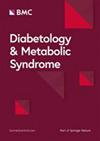控制血糖对记忆力、海马体积和抑郁症状的影响
IF 3.4
3区 医学
Q2 ENDOCRINOLOGY & METABOLISM
引用次数: 0
摘要
糖尿病和血糖控制不佳已被证明会对认知能力产生负面影响,同时还会增加情绪障碍和大脑结构萎缩的风险。萎缩部位包括海马体,而海马体与记忆力和抑郁症都有关联。目前的研究旨在更好地描述血糖控制不佳、记忆表现和抑郁症状之间的关联,并研究海马体积的损失是否代表了这些关联背后的神经病理学机制。1331 名参与者(60.9% 为女性,年龄在 18-88 岁之间(平均值 = 44.02),6.5% 可能患有糖尿病)提供了 HbA1c 数据(作为血糖控制指标),完成了一项单词表学习任务和一个经过验证的抑郁量表。392名参与者中的一个子样本接受了结构性核磁共振成像;使用FreeSurfer提取了海马体积。偏相关分析(控制年龄、性别和教育程度)显示,在全部样本中,较差的血糖控制与较低的单词表记忆能力有关。在核磁共振成像子样本中,较差的血糖控制与较高的抑郁症状和较低的海马体积有关。海马总体积在一定程度上调节了 HbA1c 水平与抑郁症状之间的关系。研究结果强调了血糖控制对记忆、抑郁和海马体积的影响,并表明海马体积减少可能是HbA1c和抑郁风险之间联系的病理生理机制;炎症和应激激素相关过程可能在其中发挥作用。本文章由计算机程序翻译,如有差异,请以英文原文为准。
Effects of glycaemic control on memory performance, hippocampal volumes and depressive symptomology
Diabetes and poor glycaemic control have been shown to negatively impact cognitive abilities, while also raising risk of both mood disorders and brain structural atrophy. Sites of atrophy include the hippocampus, which has been implicated in both memory performance and depression. The current study set out to better characterise the associations between poor glycaemic control, memory performance, and depression symptoms, and investigate whether loss of hippocampal volume could represent a neuropathological mechanism underlying these. 1331 participants (60.9% female, age range 18–88 (Mean = 44.02), 6.5% with likely diabetes) provided HbA1c data (as an index of glycaemic control), completed a word list learning task, and a validated depression scale. A subsample of 392 participants underwent structural MRI; hippocampal volumes were extracted using FreeSurfer. Partial correlation analyses (controlling for age, gender, and education) showed that, in the full sample, poorer glycaemic control was related to lower word list memory performance. In the MRI sub-sample, poorer glycaemic control was related to higher depressive symptoms, and lower hippocampal volumes. Total hippocampus volume partially mediated the association between HbA1c levels and depressive symptoms. Results emphasise the impact of glycaemic control on memory, depression and hippocampal volume and suggest hippocampal volume loss could be a pathophysiological mechanism underlying the link between HbA1c and depression risk; inflammatory and stress-hormone related processes might have a role in this.
求助全文
通过发布文献求助,成功后即可免费获取论文全文。
去求助
来源期刊

Diabetology & Metabolic Syndrome
ENDOCRINOLOGY & METABOLISM-
CiteScore
6.20
自引率
0.00%
发文量
170
审稿时长
7.5 months
期刊介绍:
Diabetology & Metabolic Syndrome publishes articles on all aspects of the pathophysiology of diabetes and metabolic syndrome.
By publishing original material exploring any area of laboratory, animal or clinical research into diabetes and metabolic syndrome, the journal offers a high-visibility forum for new insights and discussions into the issues of importance to the relevant community.
 求助内容:
求助内容: 应助结果提醒方式:
应助结果提醒方式:


